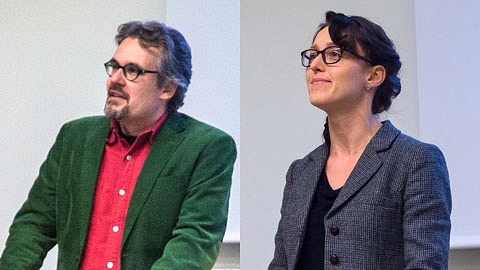The Center for North American Studies Transcends Disciplines
– United States is a global superpower, whose actions affect the rest of the world directly or indirectly. Whether it is politics, environment or ICT, the United States is usually somehow involved, says Docent Benita Heiskanen, the Director of John Morton Center.

In February, the John Morton Center (JMC) for North American studies was established in the Faculty of Social Sciences. Led by Heiskanen, it has gathered together researchers from all over Finland and the world. According to Heiskanen, the international network already includes over a hundred researchers of the field of study from different disciplines and universities. When Heiskanen is asked why the research on North America and especially the United States is so important, she gives a thoughtful reply.
–The task of the universities is to critically examine everything that is taking place in the society. With a significant superpower such as the United States, we cannot leave the research only for the Americans and just take their version as the truth.
For a start, the JMC has funding for three years. The main task of the first years is to launch the research activities. One goal is to get several full-time researchers for the Center and a visiting post doc researcher with a Fulbright scholarship, for example. There are also hopes of getting a professorship in the future.
– So that the Center can offer independent education and have its own students, we need a professorship. Our hope is that we will get a professorship of the North American studies as a donation to Turku. The Universities of Helsinki and Tampere already have one.
Topical, Multidisciplinary and International Research
Heiskanen describes the North American studies as interdisciplinary research on culture, history and society. According to her, the Center has already initiated collaboration with different faculties that transcends the borders between disciplines.
– The main emphasis of our research is on current issues and that is why we are located at the Department of Political Science and Contemporary History. However, the JMC is a multidisciplinary research centre and we do not favour a certain discipline or theoretical views over others. The starting point is that the research question defines what tools are used to finding the answer.
Even though the focus of the Center is in North America, it cannot in its studies leave out the phenomena happening outside the continent in the global, interdependent world, says Heiskanen.
– The research on North America was for a long time quite self-centred. However, the situation has changed in the last 15–20 years. The research has moved on from studying power relations from the point of view of a nation state towards a transnational approach. It is thought that nations are connected to each other and that their actions have an impact on the whole world.
The more global trend in the North American studies can also be seen in the JMC’s activities. On Tuesday, 2 December, the Center organised Transnational Security Crises seminar, where one Finnish and three international researchers gave presentations on current international security crises. The event was part of the JMC’s Current Issues series of seminars. At the same time, it functioned as an opening to the theme of the Center’s next year programme which is security issues in North America.
The Controversial Motives of Western Jihadists

Thomas Schmidinger and Kirstine Sinclair lecturing on the ISIS group.
The Transnational Security Crises seminar concentrated particularly on the new powerhouse in the Middle East, ISIS. Two of the speakers discussed the ISIS group and the fighters it has recruited from Western countries. Last summer, the group proclaimed a caliphate in the areas of Iraq and Syria, which the group calls today an Islamic state.
– One of the powers of the so-called Islamic state is the foreign fighters, most of whom come from the Middle East or North Africa. In Europe, the jihadists joining the ISIS group pose a bigger problem than in the United States, says Thomas Schmidinger from the University of Vienna.
More fighters have left for the Middle East from Europe than from the United States. According to Schmidinger, the motives of the young western jihadist for joining the ranks of ISIS are not religious.
– The young men are looking for a purpose and communality but are religiously illiterate. Social media has an important role in the spreading of the jihadist propaganda.
Kirstine Sinclair from the University of Southern Denmark disagreed with Schmidinger. She presented the three most common reasons for young people’s willingness to leave and fight in the Middle East and one of the reasons is religion.
– If the individuals participating in the fight say that they are fighting for the glory of their god, it is entirely believable to me. We can of course debate what true Islam is and what kind of religion works this way.
Text and photos: Heikki Kettunen
Photo on main page: heyerlein
Translation: Mari Ratia